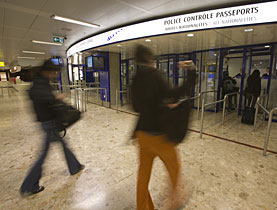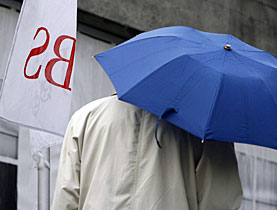Iceland’s destiny puts Swiss on the spot

Never say never. A leading casualty of the economic crisis, Iceland is now seeking a safe harbour in the European Union, leaving its Efta friends looking rather lonely.
The decision by Iceland’s parliament to apply for EU membership may not have a direct effect on Switzerland, but it does draw attention to the special case Switzerland has become, surrounded on the map by an expanding sea of blue EU countries.
As one of the club of four which make up the dwindling membership of the European Free Trade Association (Efta), – with Iceland, Norway and Liechtenstein – Switzerland will be watching with interest to see how the Icelandic bid progresses.
Financial meltdown has pushed the island nation to seek EU membership but the country remains divided on the issue and a final decision whether to join will be put to a popular vote. The process could take three years or more.
Historic vote
The membership bid is a trade-off between the Nordic country’s cherished independence and the stability it now seeks. “This is probably the most historic vote in the history of our parliament since the founding of the republic,” Prime Minister Johanna Sigurdardottir said afterwards.
The debate in Switzerland on joining the EU never fully goes away and indeed the country has a membership application on ice in Brussels, but pro-European voices have been quiet over the past few years.
Swiss officialdom has enough on its plate defending its position on banking secrecy against the wrath of powerful adversaries such as Germany and the United States.
“The bilateral disputes right now make it exactly the wrong time to ask for membership,” professor Richard Baldwin of Geneva University’s Graduate Institute of European studies told swissinfo.ch.
“If Switzerland started negotiations with the EU now, that would give the EU more leverage over Switzerland to change its financial policies,” he added.
And then of course there is the electorate, who have a habit of being wary of Brussels.
Members only
In the meantime there are the structures provided by Efta and the gamut of bilateral accords through which Switzerland’s dealings with the EU are regulated.
Efta was set up in 1960 as a reaction to the establishment of the European Economic Community (EEC), the predecessor of the EU.
“It was a very useful thing because it allowed all the non-EEC people to coordinate and have their own club. But over the years everybody switched clubs,” Baldwin explained.
Jokingly referred to by some Swiss diplomats as the European Fish Trade Association, because fishing rights have been the main sticking point of the Nordic members, Efta also brought into being the European Economic Area (EEA).
But Switzerland opted out of the EEA agreement which means the main role of Efta for Switzerland is in negotiating third party trade agreements with countries further afield, like Colombia at the moment.

More
EU bilateral accords
Safety in numbers
In a world where Efta fades into insignificance, would Switzerland not need the protection of the EU more than ever? This is what an editorial in the Tages-Anzeiger newspaper argued following the news from Iceland. The paper quoted former Soviet leader Michael Gorbachev’s warning that life punishes those who are late.
“How else [other than as an EU member] can Switzerland deal with the massive attacks on its banks and legal system from all sides, from the US, Brussels, Germany and even Libya?,” it asks.
Baldwin believes EU membership will come one day happen – but when the time is right. “In the end it’s quite clear that the course of history will involve Switzerland joining the European Union but it will happen when the EU gets ready for Switzerland and not the other way round.”
“The EU has enlarged so much that it has essentially transformed itself into something a lot more friendly to Switzerland,” he said, citing the possibility for member states to opt out of the Schengen Accord, the single currency or defence policy.
As for the likely impact of Iceland becoming an EU member on Switzerland’s larger Efta ally Norway, the secretary general of Efta, Norwegian Kåre Bryn, sees no change in direction.
His compatriots last voted against EU membership in 1994. “This dossier has remained frozen since then, despite the joining of our Scandinavian neighbours,” Bryn said in an interview published in the Swiss newspaper Le Temps.
The European Free Trade Association, of which Switzerland is a member, is an intergovernmental organisation which promotes free trade and the strengthening of economic relations.
Its other members are Iceland, Liechtenstein and Norway.
Founded in 1960 and based in Geneva, Efta has free trade accords with several countries.
Apart from Switzerland, the other Efta members are all part of the European Economic Area. Efta’s membership has declined as countries have left the association to join the European Union.
Iceland is struggling to get its economy going after its banking system collapsed in October and the government sought a $10 billion bailout led by the International Monetary Fund.
Iceland’s parliament voted on July 16 to authorise the government to begin accession talks with the European Union. Members of parliament voted 33 to 28 in favour of an EU application following a final round of marathon debates that lasted several days.
If its application is approved by EU member states, Iceland would put the question on actual EU membership to voters in a referendum.
Iceland unveiled a $1.5 billion plan on July 20 to recapitalise three major banks that it was forced to rescue when the financial crisis devastated its economy last year.

In compliance with the JTI standards
More: SWI swissinfo.ch certified by the Journalism Trust Initiative














You can find an overview of ongoing debates with our journalists here . Please join us!
If you want to start a conversation about a topic raised in this article or want to report factual errors, email us at english@swissinfo.ch.